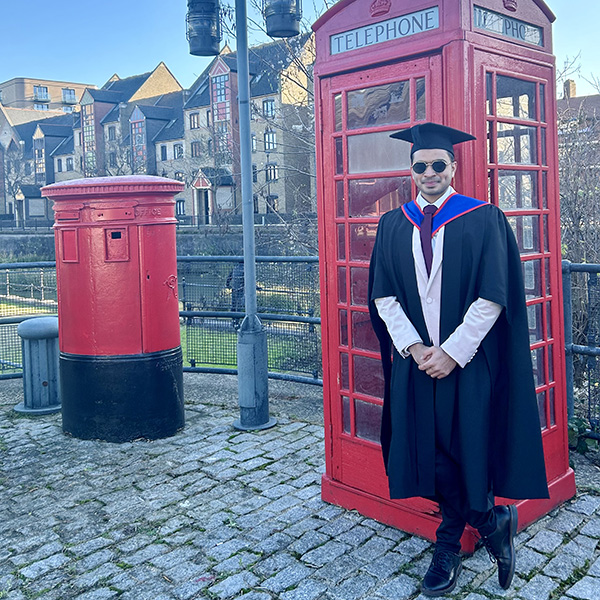Study options
- Starting in
- September 2025
- Location
- Mile End
- Fees
- Home: £12,850
Overseas: £29,950
EU/EEA/Swiss students
What you'll study
This MSc is closely aligned with The Centre for Advanced Robotics at Queen Mary (ARQ), which specialises in human-machine interaction, design and mechatronics, drones, AI and cognition and more. You can expect to gain expertise in design, kinematics, dynamics, control, electronics, programming, signal and data processing, machine learning, and manufacturing technology.
A major part of the degree is the individual project, which will be based around the internationally-recognised research taking place at ARQ.
Your project will be designed under the supervision of our academic staff, with potential for collaboration with external partners such as Shadow Robot, Ocado, Google, Automata, Kuka, Q-Bot and many others.
During your project, you’ll apply the theory from your taught modules, while taking advantage of our excellent facilities and equipment.
Accreditation
Our Advanced Robotics and Artificial Intelligence MSc has been accredited by the Institution of Mechanical Engineers under license from the UK regulator, the Engineering Council.
The accredited MSc will meet, in part, the exemplifying academic benchmark requirements for registration as a Chartered Engineer. Accredited MSc graduates who also have a BEng (Hons) accredited for CEng will be able to show that they have satisfied the educational base for CEng registration.
Graduates from an accredited MSc programme that do not also have an appropriately accredited bachelor's degree will need to have their qualifications individually assessed through the accrediting body's Individual Case Procedure if they wish to acquire CEng status.
Structure
- Four compulsory modules
- Two elective modules
- Research project
Compulsory/Core modules
The module introduces robotics as an integral part of modern automation, provides an introductory insight into the engineering design and application of robot manipulator systems. It also provides an understanding of kinematics, dynamics and trajectory planning of robotic manipulators, actuators and sensors, principles and roles in robotics. It introduces various aspects of robot modelling and control and problems encountered in robot programming and their remedies.
The module is an intensive research module that spans all three MSc semesters. It draws together the knowledge and skills from the taught component to address a research challenge of significant scope to be undertaken independently, under supervision. It focuses on the technical, project management and communication skills needed to successfully execute academic- and/or industry-oriented research. The project entails to apply research methods to solve original problems of fundamental or applied nature.
The new module focuses on electronic engineering aspects of sensing and instrumentation systems. It integrates the themes of signal theory, metrology, sensing & transduction, signal acquisition and conditioning for further processing, analysis, characterisation and design of sensing electronic systems, system-level considerations and sensor data analysis techniques. The knowledge and skills developed through this module are essential for any student engaging in the design of systems which extract signals from, or interact with the real world, and are highly relevant to electronic engineers designing, testing and using sensing systems and applications.
This module addresses the emerging field of autonomous systems possessing artificial reasoning skills and also environment and context awareness. The module will introduce students to advance numerical and computational techniques associated with machine learning and artificial intelligence. Successfully-applied algorithms and autonomy models form the basis for study, and provide students an opportunity to design such a system as part of their coursework project. Theory and practical applications will be linked through discussion of real systems such as medical robotic surgeons and robotic musicians.
Deriving insight from data is essential to problem-solving innovation in modern engineering disciplines. To gain this insight, the data needs to be understood and appropriately interpreted. In this module, you will develop tools, systems, and processes to enable the application of artificial intelligence in real-world contexts. You will learn probability theory and the transformation of data from a high- into a low-dimensional space. You will develop statistical thinking in order to design data collection, derive insights from visualising data, obtain supporting evidence for data-based decisions and construct models for predicting future trends from the data. You will learn techniques applied to your discipline for unsupervised and supervised learning and apply them to automating routine engineering tasks, and to apply machine learning approaches to complex and critical systems in a holistic and system-oriented way.
Elective modules
This module covers techniques and tools for modelling complex real-world engineering systems. Key steps of creating and using models are presented from general-purpose conceptual modelling to analytical and simulation models using simulation tools and environments. Topics include object process methodology (OMP) for system engineering, systems modelling languages (UML/SysML), simulation paradigms (discrete, continuous, deterministic, stochastic, agent-based models, human and hardware in the loop simulation), verification and validation of models and emerging topics such as digital twins. The modelling process is demonstrated throughout the module using case studies of real-world engineering systems.
This module covers the fundamental areas of medical robotics and surgical techniques, introducing various medical robotic systems and their applications. These include surgical robots and robotic devices, prosthetics, assistive and rehabilitative robots and endoscopic robots. An insight into the engineering design, fabrication, control and comprehensive operation will be provided. In addition, a wide range surgical techniques and safety with a focus on equipment for use in surgery will be included. The importance of electrical safety, the regulations governing equipment, the principles of operation of a number of important monitoring devices and some of the major medical equipment used within a surgical environment will be covered.
This module is an in-depth study of the intersection of Artificial Intelligence (AI) and imaging science. The module covers key concepts in both fields, including machine learning algorithms and techniques for data gathering in imaging systems. It is designed for students who work with imaging systems, such as cameras, microscopes, MRI/CT scanners, and ultrasound devices, and want to learn more about how to apply machine learning to improve their data gathering and analysis. The module is also suitable for students who are familiar with medical imaging and/or statistical thinking and want to learn more about the applications of these techniques in imaging systems, or for those who already work with both fields and want to gain a new perspective on the topic. It is also appropriate for students with strong mathematical and signal processing backgrounds who want to learn about both fields.
This module will explore sensing and measuring physical quantities interfaced to computer-based data acquisition and processing tools. As the signals produced are often complex and plentiful, tools to process and analyse them appropriately will be covered. Additionally, both theoretical and practical skills of data acquisition, build and signal processing will be taught. Key software of importance for managing the signals will be introduced and applied to students' fields of interest.
This module will introduce several dimensions of ethical design, considering the system life cycle including the impact of end-of-life. Elements incorporating ethics into effective system design using a modern set of theoretical frameworks including circular economy, planetary boundaries and environmental life cycle assessment will be considered. The consequential impact of large scale technology shifts to guard against replacing one problem for another will be covered. The role of meeting and contributing to environmental regulation and policy will be explored and an 'ethical cost benefit analysis' will be introduced that internalises otherwise external environmental costs. Decision making under a complex array of economic and environmental objectives will be considered via multi-criteria decision analysis.
Please note that all modules are subject to change.
Assessment
- You will be assessed using a mixture of formal examinations and coursework in your taught modules.
- You will undertake self-directed work in completing your extended research project.
Research project
You’ll work within our research team at ARQ, supervised by an academic member of staff.
Past project examples include:
- Design and control of robotic exoskeltons for walking assistance.
- Intelligent mobile robotic system for teleoperation in unstructured environments.
- Human-robot interaction for virtual reality.
- Autonomous control of deployable micro aerial vehicles.
- Development of novel mobile manipulator for robotic construction.
- Design and control of multimodal legged mobile robots.

—"I was impressed by the vibrant and diverse community on campus, with people from all over the world sharing their unique perspectives.
While the programme was intensive and challenging, the professors and tutors were supportive and knowledgeable, providing us with the necessary resources to succeed.”
Mohmad Azim Master, Advanced Robotics MSc (2023)
Teaching
This course is taught by the School of Engineering and Materials Science, drawing on the expertise of academics conducting high-quality research in a wide range of areas. This research feeds into our teaching at all levels, ensuring you share in the latest advancements.
You will be taught using a combination of lectures, seminars, laboratory practicals, as well as a variety of coursework.
You will be assigned an Academic Advisor who will guide you in both academic and pastoral matters throughout your time at Queen Mary.
Where you'll learn
Facilities
- Our Robotics Laboratory is equipped with robotic arms, mobile platforms, mechatronic and control systems, humanoid robotic systems, virtual reality and haptic interfaces and human motion tracking systems.
- The lab is also home to the ARQ prototyping space, featuring 3D printers, a CNC milling machine and silicone-casting station.
- You'll also have access to facilities like the Electronics Lab, the mechanical workshop and the Makerspace.
Explore our facilities using our virtual tour.
Campus
Teaching is based at our Mile End campus. These facilities are also used for industrial contract testing and external collaborations.
About the School
School of Engineering and Materials Science
The School of Engineering and Materials Science (SEMS) was the first School in the UK to open a materials department and we’ve been at the forefront of international engineering and materials research ever since.
The internationally competitive work of our research groups pushes the boundaries of science: we’ve been awarded substantial grants to explore the creation of technology to capture energy from sea waves and develop artificial kidneys to avoid animal testing. Our research is even celebrated on stamps!
School of Electronic Engineering and Computer Science
The School of Electronic Engineering and Computer Science carries out world-class research – and applies it to real-world problems. Being taught by someone who is changing the world with their ideas makes for exciting lectures, and helps you to stay ahead of the curve in your field. 99 per cent of our research is classed as ‘world-leading’ or ‘internationally excellent’ (REF 2021).
We are proud of our excellent student-staff relations, and our diverse student body, made up of learners from more than 60 countries.
The School has a close-knit student community, who take part in competitions and extracurricular lab activities.
Career paths
Graduates of this programme will be well-equipped to pursue Robotics, AI and Software Engineer positions in a wide range of industries, as well as doctoral research.
Our Industrial Liaison Forum gives you the chance to network with our industrial partners and build your professional contacts while at university.
- 95% of Engineering and Materials Science postgraduates are in employment or study 15 months after graduation (GOS, 2021/22)
- 89% of those postgraduates are in highly skilled roles (GOS, 2021/22)
Fees and funding
Full-time study
September 2025 | 1 year
- Home: £12,850
- Overseas: £29,950
EU/EEA/Swiss students
Conditional deposit
Home: Not applicable
Overseas: £2000
Information about deposits
Queen Mary alumni can get a £1000, 10% or 20% discount on their fees depending on the programme of study. Find out more about the Alumni Loyalty Award
Funding
There are a number of ways you can fund your postgraduate degree.
- Scholarships and bursaries
- Postgraduate loans (UK students)
- Country-specific scholarships for international students
Our Advice and Counselling service offers specialist support on financial issues, which you can access as soon as you apply for a place at Queen Mary. Before you apply, you can access our funding guides and advice on managing your money:
Entry requirements
UK
Degree requirements
A 2:2 or above at undergraduate level in Engineering subjects, Computer Science, or Applied Mathematics.
Other routes
Applicants with STEM education backgrounds can be considered, subject to demonstrating satisfactory knowledge of programming.
Find out more about how to apply for our postgraduate taught courses.
International
English language requirements
The English language requirements for our programmes are indicated by English bands, and therefore the specific test and score acceptable is based on the band assigned to the academic department within which your chosen course of study is administered. Note that for some academic departments there are programmes with non-standard English language requirements.
The English Language requirements for entry to postgraduate taught and research programmes in the School of Biological and Behavioural Sciences falls within the following English band:
Band 4: IELTS (Academic) minimum score 6.5 overall with 6.0 in each of Writing, Listening, Reading and Speaking
We accept a range of English tests and qualifications categorised in our English bands for you to demonstrate your level of English Language proficiency. See all accepted English tests that we deem equivalent to these IELTS scores.
Visas and immigration
Find out how to apply for a student visa.









